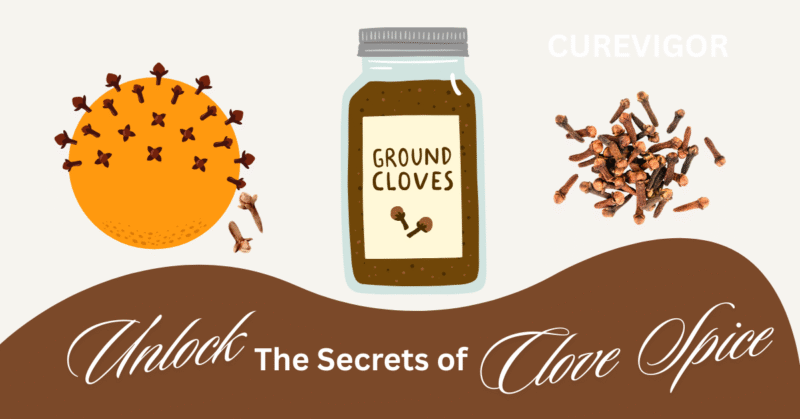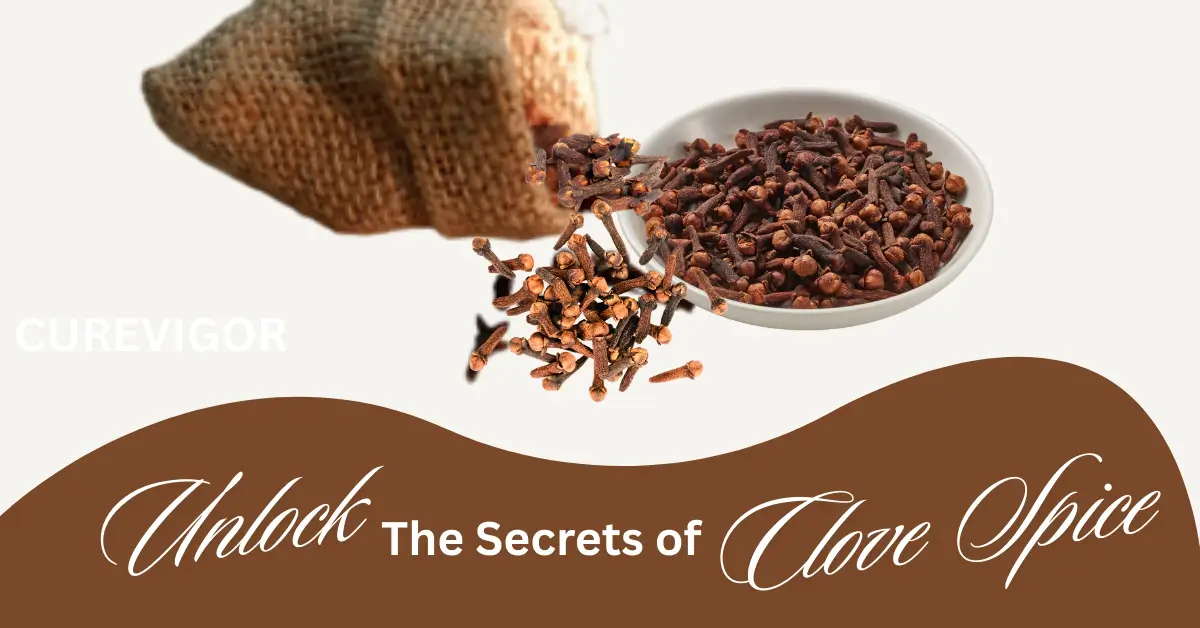Find the health benefits, culinary uses, and history of cloves in this complete guide. Learn how to use it in cooking, remedies, and more!
Thank you for reading this post, don't forget to subscribe!How to Unlock the Secrets of Clove Spice
More than just a flavor enhancer, cloves have numerous health advantages and can be used in a variety of recipes. This tiny, aromatic flower bud from the Syzygium aromaticum tree has been treasured for centuries in traditional medicine, culinary arts, and wellness practices.
Whether used whole or ground, cloves spice brings warmth, depth, and remarkable health benefits to food and remedies alike. In this guide, we’ll explore its origins, types, uses, and how you can incorporate it into your health and wellness lifestyle.
A. What is clove spice?
Cloves are the dried, unopened flower buds of a tropical evergreen tree native to Indonesia’s Maluku Islands, often called the “Spice Islands.” Today, cloves are cultivated in several countries, including Madagascar, Zanzibar, Sri Lanka, and India.
Known for their strong aroma and warm, slightly sweet flavor, cloves are a common ingredient in spice blends, teas, and herbal remedies.
The clove spice is the aromatic dried flower bud of the Syzygium aromaticum tree, native to the Maluku Islands in Indonesia. With a warm, pungent, and slightly sweet flavor, clove spice has been prized for centuries in cooking, medicine, and even perfumery.
Historically, the clove spice was so valuable that it sparked global trade wars. Today, it remains a staple in kitchens and natural remedies worldwide.
B. Why Explore Clove Spice?
The clove spice is more than just a fragrant addition to your kitchen cabinet. From soothing toothaches to spicing up holiday desserts, cloves spice has countless applications. In this guide, we’ll uncover its rich history, health benefits, and best culinary uses.
The Rich History and Origin of Clove Spice
A. Ancient Roots: Journey of Clove Spice
The clove spice has been used for over 2,000 years, with records from China’s Han Dynasty (206 BCE–220 CE) mentioning its medicinal properties. Traders carried cloves along the Silk Road, making it a luxury item in Europe and the Middle East.
B. Cloves Spice in Global Commerce
During the Age of Exploration, European powers fought for control of the Spice Islands, where the clove spice was exclusively grown. Up until the 18th century, the Dutch controlled the whole market. The Latin word clavus, which means “nail,” is where the word “clove” originates.
Varieties of Clove Spices
Although all cloves come from the same plant species, their growing regions influence their flavor and aroma. The most popular varieties include:
- Indonesian Cloves—Renowned for their strong, rich aroma; often used in premium spice blends.
- Zanzibar Cloves—Slightly milder with a sweet undertone, ideal for desserts and warm drinks.
- Madagascar Cloves—Highly aromatic and versatile, suitable for both savory and sweet dishes.
Health Benefits of Clove Spice
The clove spice is a powerhouse of nutrients and plant compounds, especially eugenol, which is responsible for many of its medicinal properties. Here are its top health benefits:
1. Rich in Antioxidants
Clove spice is one of the richest sources of antioxidants, thanks to eugenol, a compound that combats oxidative stress and free radicals. Cloves contain high levels of antioxidants that help combat oxidative stress, supporting overall health and slowing the signs of aging.
2. Supports Digestive Health
Cloves stimulate digestive enzymes. It’s often used in Ayurveda for gut health. Traditionally used to relieve bloating, gas, and indigestion, clove spice can stimulate digestive enzymes and improve gut function.
3. Anti-Inflammatory Properties
Eugenol also has strong anti-inflammatory properties, helping reduce pain and swelling, making cloves a useful spice for arthritis and sore muscles. Eugenol in cloves helps reduce inflammation, making it beneficial for joint health and chronic inflammatory conditions.
4. Boosts Oral Health
A natural treatment for gum disease and toothaches is clove oil. Its numbing effect makes it a popular choice for dental pain relief. Cloves have natural antibacterial properties that can help fight oral bacteria, freshen breath, and soothe a toothache (often via clove oil).
5. Potential Benefits for Blood Sugar Regulation
Studies suggest cloves may help regulate blood sugar, making it beneficial for diabetics. Some studies suggest the clove spice may improve insulin function, supporting healthy blood sugar levels.
6. Other Therapeutic Uses
- Liver health: Cloves’ eugenol may shield the liver from oxidative stress and support normal liver function.
- Anticancer potential: Research is ongoing.
- Respiratory relief: Helps with coughs and congestion.
7. Spice Cloves Boost Immunity
Cloves are an antiviral and antibacterial spice that boosts immunity and fights infections.
Whole vs Ground Cloves Spice
- Whole Cloves – Best for long-term storage; ideal for infusing into rice, stews, or beverages.
- Ground Cloves – Convenient for baking and spice blends, but lose potency more quickly.
For the freshest flavor, buy whole cloves and grind them at home when needed.
Cooking Uses of Cloves Spice
Cloves spice has a bold flavor, so a little goes a long way. Here are some popular culinary uses:
- Savory Dishes: Curries, biryani, marinades, soups, and stews.
- Sweet Recipes: Cakes, cookies, pumpkin pie, and festive holiday treats.
- Beverages: Masala chai, mulled wine, spiced coffee, and herbal teas.
- Spice mixes: Middle Eastern mixes, Chinese five-spice, and Garam Masala.
Tip: When cooking with whole cloves, remove them before serving to avoid an overpowering bite.
Culinary Applications of Cloves Spice: Flavoring Your World
One of the most powerful and adaptable spices in the world is cloves. Its intense warmth, sweetness, and peppery depth make it a favorite in both savory and sweet dishes.
However, its strong flavor means a little goes a long way—just one or two whole cloves can transform a dish.
A. Understanding the Flavor Profile of Cloves Spice
Cloves spice delivers a complex, multi-layered taste:
- Primary notes: Warm, sweet, and slightly fruity (similar to allspice but sharper).
- Secondary notes: Peppery, woody, and a touch of bitterness.
- Aroma: Intensely fragrant, with hints of camphor and menthol due to eugenol (its main essential oil).
Pro Tip: To test freshness, press a clove between your fingers—it should release a strong, spicy-sweet aroma. If it smells dull, it’s lost potency.
B. Whole vs. Ground Cloves Spice: When and How to Use
1. Whole Cloves Spice – Best for Slow Infusion
- Uses: Stocks, broths, braises, pickling liquids, mulled wine, and tea.
- Why? They release flavor gradually without overpowering.
- How to Use:
- Stick them into onions or citrus peels for soups (French oignon piqué technique).
- Remove before serving (biting into one is unpleasant!).
2. Ground Cloves Spice – Ideal for Even Distribution
- Uses: Baking, spice blends, rubs, and sauces.
- Why? Blends seamlessly into dry mixtures.
- How to Use:
- ⅛ to ¼ tsp per dish is often enough.
- Toast lightly before grinding to enhance aroma.
Chef’s Secret: For the freshest flavor, grind whole cloves in a spice grinder as needed.
C. Cloves Spice in International Cuisines – Beyond the Basics
1. Indian Cuisine – The Heart of Spice Blends
- Garam Masala: Cloves spice is a key player, adding warmth.
- Biryani & Pulao: Whole cloves are tucked into rice for fragrance.
- Chai Tea: Cardamom and cinnamon are used to add depth to the tea.
2. Middle Eastern & North African Cuisine
- Moroccan Tagines: Paired with cinnamon and dried fruit for sweet-savory balance.
- Persian Rice Dishes: Often studded with cloves for aroma.
- Baharat Spice Mix: A blend used in meat dishes.
3. Southeast Asian Cuisine
- Indonesian Gulai & Rendang: Cloves spice adds complexity to coconut-based curries.
- Vietnamese Pho: A single clove in the broth adds subtle warmth.
4. Western Cuisine – Sweet & Savory Staples
- Holiday Baking: Essential in pumpkin pie, gingerbread, and speculoos cookies.
- Cured Meats: Used in brines for ham and sausages.
- Mulled Wine & Cider: Simmered with citrus and cinnamon sticks.
D. Popular Dishes Featuring Cloves Spice – From Street Food to Fine Dining
Savory Dishes
- Indian Rogan Josh (Lamb Curry) – A Kashmiri specialty with cloves in the masala.
- A pot roast marinated in a brine of spiced vinegar is known as German sauerbraten.
- Ethiopian Berbere Spice Mix – Adds heat and depth to stews.
- Pickles & Chutneys – Cloves spice balances acidity in bread-and-butter pickles.
Sweet Dishes
- Swedish Pepparkakor (Ginger Snaps) – Cloves add a spicy kick.
- Mexican Atole – A warm corn drink spiced with cloves and cinnamon.
- Lebanese Ma’amoul Cookies – Stuffed with dates and spiced with cloves.
E. Perfect Pairings with Cloves Spice – Elevate Your Dishes
1. Best Spice Combinations
- Cinnamon + Nutmeg + Cloves → Classic baking trio (pumpkin pie).
- Cardamom + Cloves + Black Pepper → Chai and biryani magic.
- Cumin + Coriander + Cloves → Savory curry base.
2. Unexpected but Brilliant Pairings
- Chocolate + Cloves → Dark chocolate truffles with a hint of spice.
- Coffee + Cloves → Arabic-style spiced coffee (Qahwa).
- Tomatoes + Cloves → Adds depth to ketchup and barbecue sauce.
Final Pro Tip: If you accidentally over-clove a dish, balance it with a splash of citrus juice or honey to soften the intensity.
Forms, Storage, and Sourcing Cloves Spice

Different Forms of Clove Spice
- Whole buds
- Ground powder
- Essential oil
- Extracts
How to Store Cloves for Maximum Freshness
Store in a dark, cool area in an airtight container. While crushed cloves remain fresh for six months, whole cloves can be stored for one to two years.
Where to Buy High-Quality Clove Spice
Look for organic, whole cloves from reputable spice merchants.
Traditional & Non-Culinary Uses of Cloves Spice: From Ancient Medicine to Modern Remedies
Cloves spice (Syzygium aromaticum) has been revered for centuries not just for its bold flavor, but also for its therapeutic, aromatic, and even pest-repellent properties.
Beyond the kitchen, cloves play a vital role in traditional medicine, home remedies, and household applications. Below, we explore its diverse uses across cultures and practical non-culinary applications.
1. Cloves in Traditional Medicine Systems
A. Ayurveda (Indian Traditional Medicine)
In Ayurveda, cloves (Lavang) are considered warming, pungent, and balancing for Kapha and Vata doshas. Key uses include:
- Digestive Aid – Chewing 1 clove after meals stimulates Agni (digestive fire), reducing bloating and indigestion.
- Respiratory Relief – Clove-infused teas or clove + honey mixtures soothe coughs, colds, and sinus congestion.
- Pain Relief – Clove oil diluted in sesame oil is massaged onto joints for arthritis or muscle aches.
B. Traditional Chinese Medicine (TCM)
In TCM, cloves (Ding Xiang) are warming and acrid, used to:
- Treat “Cold” Conditions – Such as stomach pain, nausea, and diarrhea caused by internal cold.
- Kidney Yang Tonic – Believed to support vitality and circulation.
- Dental Applications – Clove oil stops toothache pain (applied topically).
C. Unani & Middle Eastern Folk Medicine
- Clove water is used as a natural antiseptic mouthwash for gum infections.
- A paste of crushed cloves + rosewater treats acne and skin inflammation.
2. Folk Remedies & Home Uses of Cloves
A. Natural Cold & Flu Relief
- Clove Tea – Steep 2–3 cloves in hot water with ginger and honey to ease sore throat and congestion.
- Clove Steam Inhalation – Boil cloves in water, inhale steam to clear nasal passages.
B. Dental Care & Toothache Remedy
- Clove Oil for Tooth Pain – A cotton swab dipped in diluted clove oil (mixed with coconut oil) numbs pain temporarily.
- Homemade Mouthwash – Simmer cloves in water, strain, and use as an antibacterial rinse for fresh breath.
C. Digestive & Anti-Nausea Aid
- Clove + Fennel Tea – Relieves gas and bloating.
- Motion Sickness Remedy – Sucking on a clove reduces nausea during travel.
D. First Aid & Minor Wound Care
- Antiseptic Properties – Crushed clove paste (mixed with honey) can be applied to small cuts or fungal infections.
3. Non-Culinary Household Uses of Cloves
A. Natural Insect Repellent
- Ant Moth & Mosquito Deterrent – Place sachets of whole cloves + cinnamon in cupboards or burn clove oil in diffusers.
- DIY Pest Spray – Mix clove essential oil with water and spray around entry points.
B. Aromatherapy & Relaxation
- Stress Relief – Clove oil in a diffuser promotes mental clarity and relaxation (blend with orange or lavender oil).
- Potpourri Ingredient – Dried cloves add warmth to homemade potpourri mixes.
C. Natural Preservative & Odor Neutralizer
- Refrigerator Deodorizer – A small bowl of whole cloves + baking soda absorbs foul smells.
- Meat Preservation – Historically, cloves were used to delay spoilage due to antimicrobial effects.
4. Modern Adaptations & Scientific Backing
Recent studies confirm cloves’ antifungal, antibacterial, and analgesic properties, supporting traditional uses:
- Dentistry – Eugenol in clove oil is used in temporary dental fillings and oral numbing gels.
- Skincare – Clove extracts appear in acne treatments for their antimicrobial effects.
- Pain Relief Patches – Some topical analgesics include clove oil for muscle pain.
Key Takeaways
✔ Traditional Medicine – Cloves treat digestive, respiratory, and pain disorders in Ayurveda, TCM, and folk remedies.
✔ Home Remedies – Effective for toothaches, colds, nausea, and minor wounds.
✔ Household Uses – Acts as a natural insect repellent, deodorizer, and aromatherapy agent.
✔ Modern Science – Validates antimicrobial and pain-relieving properties.
Safety & Precautions
While clove spice is generally safe in small amounts, excessive use or concentrated clove oil can cause side effects.
- Avoid high doses during pregnancy or breastfeeding.
- People on blood-thinning medication should consult a doctor before consuming regularly.
- Clove oil should never be ingested in large amounts and must be diluted before topical use.
Safety Guide for Cloves Spice: Usage, Side Effects & Precautions

Cloves spice is generally safe for culinary use, but like any potent natural ingredient, it requires mindful consumption—especially in concentrated forms like clove oil. Below is a detailed breakdown of safety considerations.
A. General Safety of Cloves Spice
Culinary Use (Safe):
- Small amounts (e.g., 1–3 whole cloves or ¼–½ tsp ground per dish) are non-toxic and widely used in global cuisines.
- Cooking or steeping cloves reduces intensity, making them gentler on digestion.
Caution with Medicinal/High Doses:
- Clove oil and supplements are highly concentrated—never ingest undiluted clove oil.
- Long-term excessive intake (e.g., daily large doses) may lead to liver strain or gastrointestinal irritation.
B. Potential Side Effects of Overuse
1. Digestive Upset
- Symptoms: Nausea, acid reflux, or diarrhea (common with >2–3 tsp ground cloves at once).
- Fix: Reduce intake; pair with soothing ingredients (e.g., yogurt or ginger tea).
2. Skin/Mucous Membrane Irritation
- On skin or gums, undiluted clove oil might result in burns, redness, or numbness.
- Always dilute with a carrier oil (e.g., coconut oil) before topical use.
3. Blood Thinning (Anticoagulant Effect)
- Eugenol may slow blood clotting. Avoid high doses if you:
- Take blood thinners (warfarin, aspirin).
- Have upcoming surgery (stop clove oil 2 weeks prior).
4. Rare but Serious: Liver Toxicity
- Linked to excessive clove oil consumption (e.g., >1–2 mL/day long-term).
C. Allergic Reactions to Cloves Spice
Symptoms to Watch For:
- Skin: Rash, itching, or swelling (contact dermatitis).
- Respiratory: Wheezing or throat tightness (rare).
- Oral: Tingling/swollen lips/tongue (if allergic to eugenol).
Testing for Sensitivity:
- Patch test: Apply diluted clove oil to a small skin area; wait 24 hours.
- Start with tiny amounts of food if trying cloves for the first time.
D. Medication Interactions
High-Risk Groups:
- Diabetes Medications:
- Cloves may lower blood sugar further, risking hypoglycemia. Monitor levels closely.
- Blood Thinners (Anticoagulants):
- Combined use may increase bleeding risk (e.g., nosebleeds, bruising).
- Sedatives or CNS Depressants:
- Clove oil’s mild sedative effect could amplify drowsiness from drugs like benzodiazepines.
Doctor’s Advice:
- Consult a healthcare provider before using clove supplements/oil if you:
- Are pregnant/nursing.
- Have liver disease or a bleeding disorder.
Key Takeaways for Safe Use
✔ Cooking: Safe in normal food amounts.
✔ Clove Oil: Always dilute; avoid ingesting pure oil.
✔ Allergies: Test cautiously if sensitive to spices.
✔ Medications: Check interactions with blood thinners/diabetes drugs.
“Less is more” when it comes to cloves!
How to Add Clove Spice to Your Wellness Routine
- Incorporate a pinch of ground cloves into your smoothie in the morning.
- Brew with cinnamon and ginger for a warming herbal tea.
- Add to meat or roasted veggie spice rubs.
- Sprinkle in baked goods for an aromatic twist.
Conclusion: Embracing the Versatility of Clove Spice
The clove spice is a fragrant treasure that offers more than just flavor—it’s a nutritional and medicinal gem. From improving digestion to boosting immunity and adding a rich aroma to your favorite recipes, clove spice deserves a regular spot in your health and wellness routine.
Start small, savor its warmth, and let this ancient spice enhance both your meals and your well-being.
Recap of Key Insights
With their flavor and health benefits, cloves are both a culinary treasure and a medical wonder.
Encouragement for Exploration
Try adding clove spice to teas, dishes, or DIY remedies!
Future of Clove Spice Research
Scientists continue exploring its anti-cancer and metabolic benefits.
Final Thoughts
The clove spice is a timeless gem that has been used in kitchens and on old trading routes. Will it become a pantry mainstay for you?
Read more Health and Wellness Tips.
You might like:

